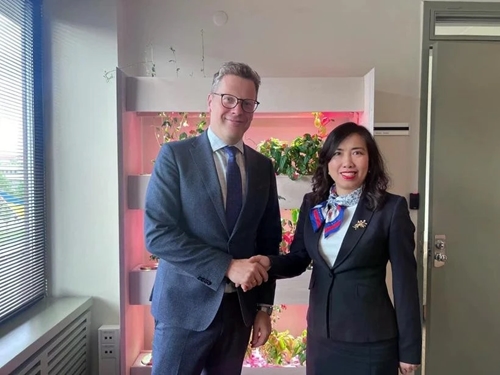Estonia is the first stopover on the PM’s European working trip, during which he will attend the third United Nations Ocean Conference (UNOC) in France and make official visits to Estonia and Sweden at the invitations of U.N. Secretary-General António Guterres, French President Emmanuel Macron, Estonian PM Kristen Michal, and Swedish PM Ulf Kristersson.
    |
 |
|
Deputy Foreign Minister Le Thi Thu Hang (right) and Estonia's Undersecretary for Political Affairs Martin Roger (Photo: baoquocte.vn) |
Robust political – diplomatic relations
Vietnam recognized Estonia’s independence on September 9, 1991, shortly after the Baltic country declared independence from the former Soviet Union.
The two countries officially established diplomatic ties at the ambassadorial level in February 1992. While neither side currently maintains a resident embassy, with Vietnam's ambassador in Finland concurrently being in charge of Estonia, and Estonia’s ambassador in China accredited to Vietnam, the political relations have steadily strengthened through regular high-level meetings and exchanges.
The two nations have established a robust consultation mechanism at the deputy foreign ministerial and regional department directorial levels, conducting five sessions to date. Three sessions took place in Vietnam in September 2008, October 2010, and December 2016, while two others were held in Estonia in July 2009 and July 2012. Throughout these exchanges, Estonia consistently affirmed Vietnam as a priority partner in Southeast Asia, expressing its desire to enhance bilateral cooperation.
Most recently, during the working trip to Estonia from May 27 - 28, Deputy Minister of Foreign Affairs Le Thi Thu Hang had meetings with Estonia’s Undersecretary for Political Affairs Martin Roger and Director General of the Department for Asia, the Pacific, the Middle East and Africa Kristi Karelsohn. The Vietnamese official underscored Vietnam's commitment to multifaceted friendship and cooperation with Estonia, and praised Estonia’s dynamic development and achievements in digital transformation. She expressed Vietnam's keen interest in learning from Estonia's experience in building e-government, digital society, and smart governance, identifying them as the areas with significant cooperation potential and aligned with Vietnam's national digital transformation strategy.
Roger, for his part, acknowledged Vietnam’s important role and position in Asia – Pacific and affirmed Vietnam as one of Estonia’s key partners in the region. Over the recent past, the two countries have joined hands and supported each other at multilateral forums, including the U.N. Security Council and the U.N. Human Rights Council.
Enhanced economic – trade cooperation
Bilateral trade between Vietnam and Estonia has demonstrated consistent growth, albeit at modest levels. Trade volume reached USD 49.1 million in 2011, increasing to USD 51.2 million in 2022, USD 62.7 million in 2023, and USD 73.8 million in 2024.
Vietnam's exports to Estonia primarily consist of seafood, fruits and vegetables, cashew nuts, coffee, plastic products, wood products, and textiles. In return, the country buys dairy products, chemicals, rubber, and wood products from Estonia.
Estonia is now running five direct investment projects worth USD 280,000 in the Southeast Asian country, covering information – communications, science – technology, and health care.
Estonia was among the earliest E.U. members to ratify the E.U. - Vietnam Investment Protection Agreement (EVIPA) and supported Vietnam with the signing of the E.U. - Vietnam Free Trade Agreement (EVFTA).
Both nations boast huge potential for cooperation in areas where one nation's strengths complement the other's needs such as IT, communications, e-government, AI, financial technology, digital economy, cybersecurity, smart logistics, and digital ports.
Regarding education – training, Estonia trained numerous Vietnamese students and researchers during the Soviet era. In 2017, the two countries forged their educational partnership by signing an agreement on education and science cooperation.
The Vietnamese community in Estonia, though small with only 30 people, has established stable roots in the capital city of Tallinn, primarily engaged in small-scale business activities.
On the back of the sound traditional friendship and multi-faceted cooperation, Prime Minister Pham Minh Chinh’s official visit to Estonia continues to affirm Vietnam’s consistent policy of valuing and seeking to strengthen relations with European nations, including Estonia.
Source: VNA